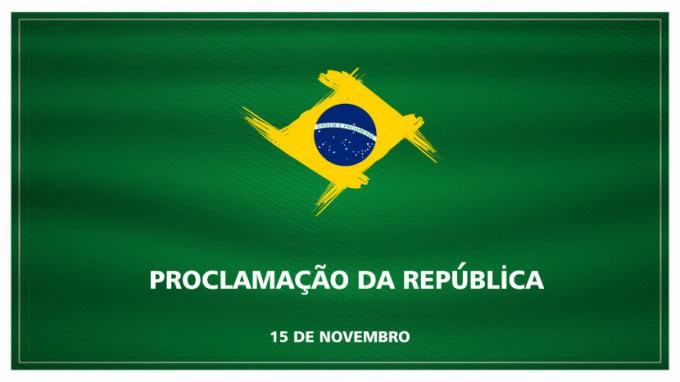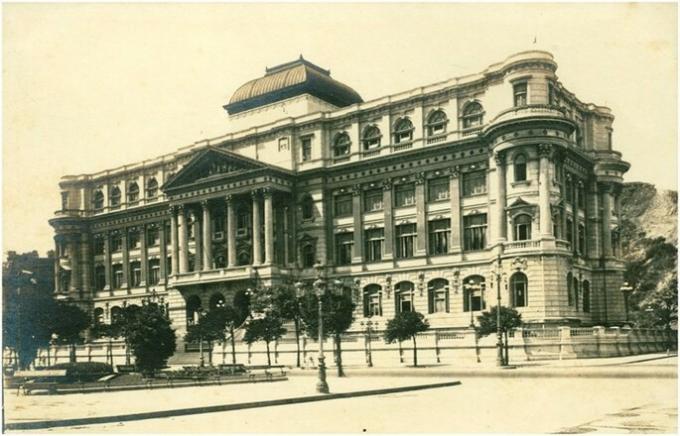In day November 15th, is celebrated in Brazil the event of Proclamation of the Republic, which took place on that same day in the year 1889. Through this historic event, the monarchy was overthrown in the country, the royal family was expelled and the republic was established. This event was, in large part, the result of the army's dissatisfaction with the monarchy.
It is openly recognized by contemporary historians that the Proclamation of the Republic was, in fact, a coup. That's because this transition happened from forced way and did not have popular participation, as it was carried out by a small minority motivated by self-interest. The republic in Brazil is currently a regime endorsed by popular vote since 1993.
Also access: See another important commemorative date in Brazil
historical background

The Proclamation of the Republic was an event led, in large part, by the Army Brazilian. In the 19th century, the
military dissatisfaction with the monarchic regime it was so big that a group of military men began to conspire against the emperor (Dom Pedro II). The fall of the monarchy in Brazil, in turn, was the result of a process of erosion of the support bases of the monarchy, which began with the end of the Paraguay War.Since the end of this conflict, a series of events has contributed to a cooling of the military's relations with the monarchy. The military were dissatisfied with the lowinvestments done in the corporation, they did not agree with the fact that they could not express political opinions and did not like to be mobilized to hunt runaway slaves.
This dissatisfaction with the monarchy was responsible for strengthening the republican ideals within the Army. At conspiracies to install the republic in the country among the military began in 1887 and mobilized important personalities of the Armed Forces.
In addition, the political context in Brazil was quite troubled in the 1880s. Alongside the dissatisfaction with the monarchy, there was a debate that left the Brazilian political scene tense: the issue ofabolition of slavery. These events allow us to say that, politically speaking, this decade was criticism in Brazil.
In addition to the fact that the foundations of the monarchy were giving way little by little, the agendas discussed helped to considerably polarize the situation in the country. Furthermore, as the abolitionist cause advanced, republicanism advanced with it, since a large part of the abolitionists were republican.
In the 1880s, in addition to the military, other groups dissatisfied with the monarchy were the eliteslaver and the churchCatholic. The elite was dissatisfied because of abolition, and the Catholic Church, because of disagreements with the monarchy. In this situation, the monarchy was left without its support groups and was susceptible to being overthrown.
The weakening of the monarchy and the strengthening of republicanism in the country can also be identified in the amount of republican parties that emerged in Brazil from the 1870s. THE questioneconomical it also weighed on the loss of support from the monarchy, as Brazil faced economic difficulties as a result of the Paraguayan War and the economic crisis of the 1870s.
Finally, dissatisfaction with the fact that Count D’Eu and the Princess Isabel being the heirs to the throne was another factor that weakened the monarchy. The unpopularity of both was due to the fact that she was a woman, and the Count a foreigner.
Proclamation of the Republic
In the month of proclamation, that is, November, the group of conspirators was determined to overthrow the Brazilian monarchy. The Republicans' last step to strengthen their conspiracy was to convince the marshal Deodoro da Fonseca, one of the great names in the Army at the time, joining them.
On November 10, important names in the conspiracy against the monarchy, such as QuintinoBocaiuva, BenjaminConstant, solonbrook, among others, met with Deodoro da Fonseca. They claimed that Solon Ribeiro would be arrested by imperial order and that Silveira Martins, a foe of Deodoro, would be appointed to head the Ministerial Cabinet.
These arguments convinced the marshal to mobilize troops for November 15, with the purpose of to overthrow the Viscount of Ouro Preto from the Ministerial Cabinet. On November 15, Deodoro da Fonseca, leading military troops, overthrew the Emperor's Ministerial Cabinet, and the Visconde de Ouro Preto was arrested.
Until that moment, the proclamation had not yet been consolidated. Throughout the day, several events happened. There was even an attempt at monarchic resistance led by Count D’Eu and André Rebouças, but that failed. Only at the end of the day was the republic proclaimed.
The Proclamation of the Republic took place in City Council of Rio de Janeiro, when the councilor JosephofSponsorship announced the installation of the republic in Brazil. A GovernmentProvisional, and Deodoro was named president. On November 17, 1889, the Emperor d. Pedro II and his family fled Brazil.
Also access: Did abolition solve the problem experienced by blacks in Brazil?
Is November 15 a holiday?

Yea, the day of the Proclamation of the Republic it's a national holiday. The first Brazilian law that determined the day as a holiday was enacted two months after the republic was installed in Brazil.
On January 14, 1890, the Decree No. 155-B, which determined the November 15 holiday as a form of commemoration of the “Brazilian homeland”. In 1930, with the beginning of It was Vargas, was issued the Decree No. 19,488, which determined that the 15th of November would be a national holiday in commemoration of the advent of the republic.
A new law in this regard was enacted during the government of Eurico Gaspar Dutra. On April 6, 1949, the president signed the Law No. 662 and reinforced November 15 as a national holiday. More recently, in the government of Fernando Henrique Cardoso, November 15th was also reinforced as a national holiday through the Law No. 10607, of December 19, 2002.
Also access: Understand why Tiradentes Day is celebrated on April 21
1993 plebiscite
As we have seen, we currently commemorate November 15th as a national holiday in remembrance of the Proclamation of the Republic. The existence of the republic currently in Brazil was reinforced through the 1993 referendum, in which the population had to choose the form of government in Brazil. In this referendum, counting the valid votes, 86.6% of Brazilians chose the republic and 13.4% chose the monarchy.
Image credit:
[1] commons


